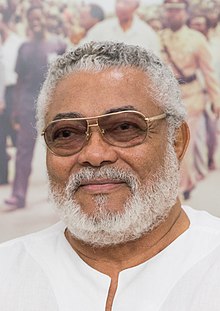
Back Jerry Rawlings AF جيري راولينغز Arabic جيرى راولينجز ARZ Jerry Rawlings AST Jerry Rawlings BAN Jerry Rawlings BR Jerry Rawlings Czech Jerry Rawlings CY Jerry Rawlings DAG Jerry Rawlings German
Jerry Rawlings | |
|---|---|
 Rawlings in 2019 | |
| 4th President of Ghana | |
| In office 7 January 1993 – 7 January 2001 | |
| Vice President |
|
| Preceded by | Himself (as Chairman of the PNDC) |
| Succeeded by | John Kufuor |
| Chairman of the Provisional National Defence Council | |
| In office 31 December 1981 – 7 January 1993 | |
| Vice President | Daniel Annan |
| Preceded by | Hilla Limann (as President) |
| Succeeded by | Himself (as President) |
| Chairman of the Armed Forces Revolutionary Council | |
| In office 4 June 1979 – 24 September 1979 | |
| Vice President | Kojo Boakye-Djan |
| Preceded by | Fred Akuffo |
| Succeeded by | Hilla Limann (as President) |
| Personal details | |
| Born | Jerry Rawlings John 22 June 1947 Accra, Gold Coast (now Ghana) |
| Died | 12 November 2020 (aged 73) Accra, Ghana |
| Resting place | Burma Camp |
| Political party | National Democratic Congress (after 1992) |
| Spouse | |
| Children | 4, including Zanetor Agyeman-Rawlings |
| Profession | Fighter pilot |
| Awards | UDS Honorary Award |
| Military service | |
| Branch/service | |
| Years of service | 1968–1992 |
| Rank | Flight lieutenant |
Jerry John Rawlings (22 June 1947 – 12 November 2020)[1] was a Ghanaian military officer, aviator and politician who led the country for a brief period in 1979, and then from 1981 to 2001. He led a military junta until 1993, and then served two terms as the democratically elected president of Ghana.[2][3][4] He was the longest-serving leader in Ghana's history, presiding over the country for 19 years.[5][6]
Rawlings came to power in Ghana as a flight lieutenant of the Ghana Air Force following a coup d'état in 1979. Prior to that, he led an unsuccessful coup attempt against the ruling military government on Tuesday, 15 May 1979, just five weeks before scheduled democratic elections were due to take place. After handing power over to a civilian government, he overthrew the democratically elected Government through a military coup on Thursday, 31 December 1981 as the chairman of the Provisional National Defence Council (PNDC).[7]
In 1992, Rawlings resigned from the military, founded the National Democratic Congress (NDC), and became the first president of the Fourth Republic. Rawlings brokered a ceasefire in 1995 during the First Liberian Civil War. He was re-elected in 1996 for four more years.[8][9] After two terms in office, the limit according to the Ghanaian Constitution, Rawlings endorsed his vice-president John Atta Mills as a presidential candidate in 2000. Rawlings served as the African Union envoy to Somalia.[10] He died in 2020 at age 73 and was accorded a state funeral.[11][12]
Rawlings is seen as a transformative leader in the history of Ghana, and is credited with leading the country through economic recovery and returning national pride to the country, along with turning Ghana into a multi-party democracy.[13] Rawlings has been described as one of Ghana's greatest leaders, and as the "transcendent African political figure of his generation".[14]
- ^ "Jerry J. Rawlings – Biography & Facts". Encyclopedia Britannica. 12 November 2020. Retrieved 8 January 2021.
- ^ "Ghana : History". thecommonwealth. Archived from the original on 7 May 2019. Retrieved 22 May 2019.
- ^ "Rawlings hails frontline health workers". MyJoyOnline. 4 June 2020. Archived from the original on 5 June 2020. Retrieved 5 June 2020.
- ^ "Jerry J. Rawlings | head of state, Ghana". Encyclopedia Britannica. Retrieved 3 August 2020.
- ^ Venkatachalam, Meera (10 August 2015). Slavery, Memory and Religion in Southeastern Ghana, c. 1850–Present (1 ed.). Cambridge University Press. p. 37. doi:10.1017/cbo9781316257852. ISBN 978-1-316-25785-2.
- ^ Sarpong, Akwasi (13 November 2020). "Jerry Rawlings: Remembering Ghana's 'man of the people'". BBC News. Retrieved 13 September 2024.
- ^ "The Legacy of J.J. Rawlings in Ghanaian Politics, 1979-2000". asq.africa.ufl.edu. Retrieved 9 June 2024.
- ^ "Flt.-Lt. (Rtd) Jerry John Rawlings Profile". Archived from the original on 14 February 2013. Retrieved 3 January 2013.
- ^ "Jerry John Rawlings Profile – MyGHPage". Retrieved 5 December 2020.
- ^ "AU Chairperson receives High Representative for Somalia, Jerry John Rawlings". MyJoyOnline. 31 January 2011. Retrieved 26 November 2020.
- ^ "Ghana buries former president Jerry Rawlings with honors". The Independent. 27 January 2021. Archived from the original on 8 June 2022. Retrieved 28 January 2021.
- ^ Accra, Staff and agencies in (12 November 2020). "Ghana's former leader Jerry Rawlings dies at 73". the Guardian. Retrieved 20 November 2020.
- ^ Adedeji, John L. (2001). "The Legacy of J.J. Rawlings in Ghanaian Politics, 1979-2000". African Studies Quarterly. 5 (2).
- ^ Shipley, Jesse Weaver (30 May 2019). "The passing of Jerry John Rawlings". africasacountry.com. Retrieved 13 September 2024.